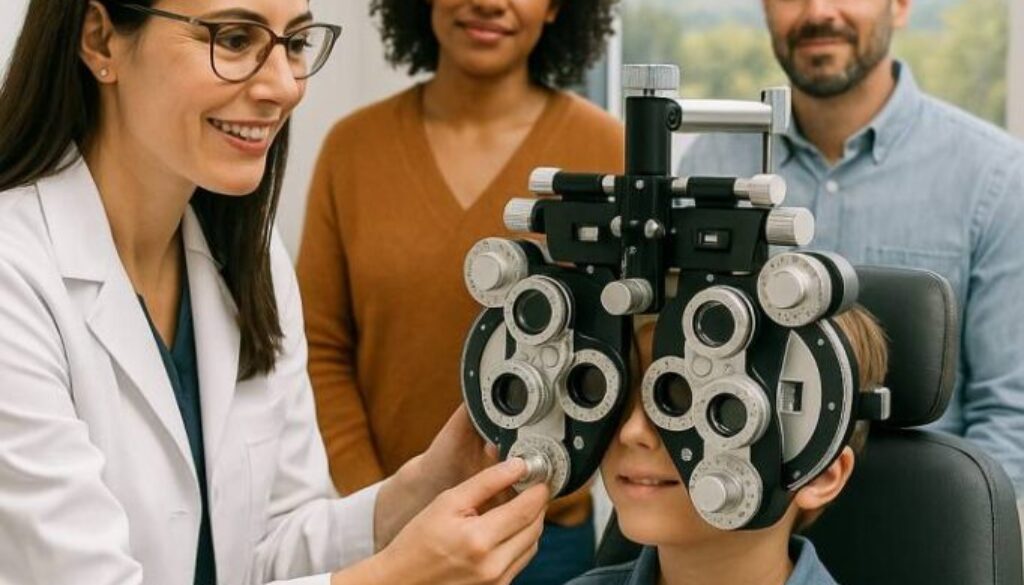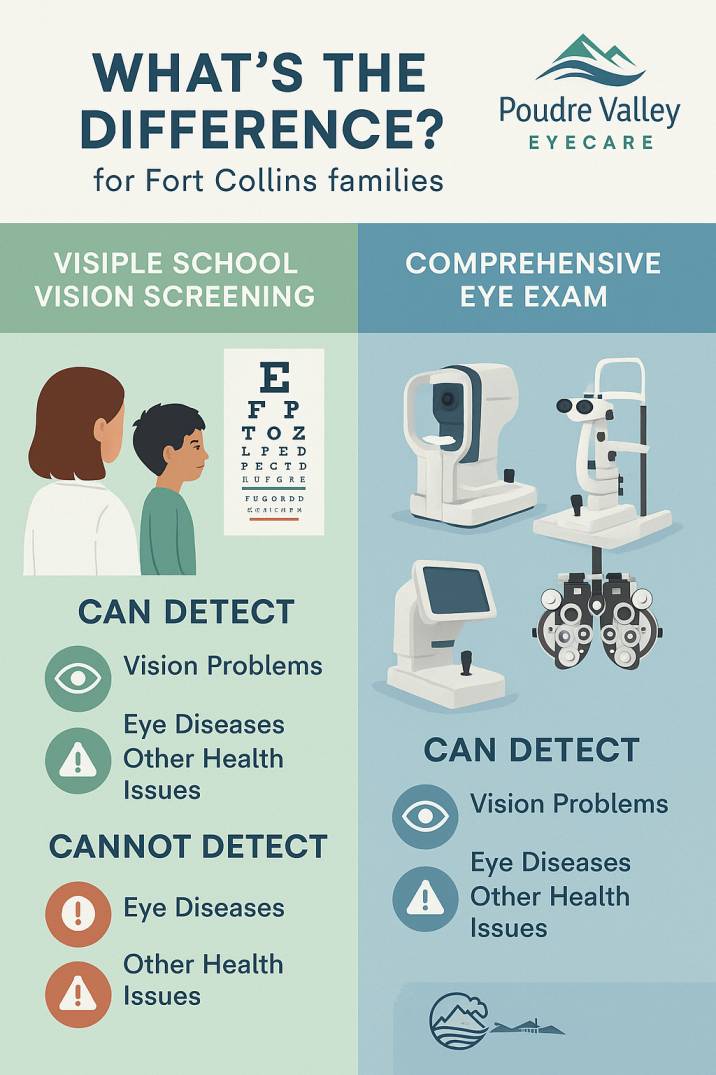Eye Exam vs Vision Screening: What Fort Collins Parents Need
Key Takeaway: School vision screenings detect only 40% of children’s vision problems. Fort Collins families require comprehensive eye examinations to safeguard their children’s academic success and identify serious ocular conditions in their earliest stages.
Executive Summary: While school-based vision screenings serve as an initial assessment tool for basic refractive errors, comprehensive eye examinations provide thorough evaluations of ocular health, visual function, and neurological pathways. Fort Collins families should prioritize annual comprehensive eye examinations to optimize their children’s learning potential and ensure early detection of sight-threatening conditions.
Understanding the Critical Distinction: Your Child’s Educational Future Depends on Clear Vision
As Fort Collins families prepare for the academic year, one essential health consideration often receives insufficient attention—comprehensive pediatric eye care. The distinction between basic vision screenings and thorough eye examinations represents far more than a simple procedural difference; it can fundamentally impact a child’s educational trajectory and long-term visual health.
For over 25 years, Poudre Valley Eyecare has served as Northern Colorado’s trusted partner in comprehensive family eye health. Through our extensive clinical experience, we have witnessed how proper vision care can transform academic performance and quality of life. This evidence-based analysis examines what Fort Collins families must understand about protecting their children’s vision and securing their educational future.
The Current Reality: Gaps in Pediatric Vision Care Detection
Limitations of Traditional School-Based Vision Screenings
Current epidemiological data from the 2021 National Survey of Children’s Health reveal concerning trends in pediatric vision care access. Research indicates that only 53.2% of children receive recommended vision screenings, and among those who do undergo screening, traditional school-based assessments fail to identify significant visual dysfunction in approximately 60% of affected children.
Fort Collins area educational institutions, including the Poudre School District, implement vision screening protocols within resource constraints. However, these abbreviated assessments typically evaluate only:
- Distance visual acuity assessment (monocular clarity at 20-foot testing distance)
- Basic refractive error detection (primarily myopia identification)
- Gross ocular alignment evaluation (obvious strabismus only)
Critical Diagnostic Gaps in School-Based Assessments
The Colorado Optometric Association and leading pediatric vision researchers emphasize that conventional school vision screenings cannot detect:
- Binocular vision dysfunction affecting reading comprehension and academic performance
- Accommodative insufficiency impairing sustained near-vision tasks
- Depth perception deficits compromise spatial awareness and athletic performance
- Color vision anomalies impacting the interpretation of educational materials
- Ocular pathology, including pediatric glaucoma, cataracts, and retinal disorders
- Visual processing disorders affect learning despite adequate visual acuity
Comprehensive Eye Examinations: The Clinical Gold Standard for Fort Collins Families
Components of a Comprehensive Pediatric Eye Examination
A comprehensive eye examination transcends basic visual acuity assessment, incorporating systematic evaluation of ocular health, visual function, and neurological pathways. These examinations evaluate overall eye health through a comprehensive assessment of visual acuity, refractive status, binocular vision function, and detection of ocular pathology. Fort Collins eye care specialists conduct multi-faceted evaluations during comprehensive examinations:
Visual Function and Performance Assessment:
- Binocular vision coordination and eye movement patterns
- Accommodative (focusing) amplitude and facility
- Peripheral visual field evaluation
- Stereoscopic depth perception testing
- Color discrimination assessment
Ocular Health and Pathology Evaluation:
- Fundoscopic retinal examination for pathology detection
- Optic nerve head assessment for glaucomatous changes
- Intraocular pressure measurement for glaucoma screening
- Anterior segment evaluation for developmental anomalies
- Pupillary response and neurological function testing
Advanced Diagnostic Technology Integration: Contemporary Fort Collins eye care practices, including Poudre Valley Eyecare, employ state-of-the-art diagnostic instrumentation:
- Digital retinal imaging for early pathology detection
- Automated refraction systems for precise refractive measurements
- Optical Coherence Tomography (OCT) for detailed retinal analysis
- Corneal topography for anterior segment evaluation
The Academic Impact: Why 80% of Learning is Visual
The Fort Collins School Connection
According to experts, 80% of learning is visual, which means undetected vision problems directly impact your child’s academic performance. Fort Collins families need to understand that excellent grades and good vision health go hand-in-hand.
Recent research shows alarming trends:
- A major 5-year study (2016-2020) found vision screening prevalence declined from 69.6% to 60.1%, a 13.6% relative decrease
- Over half of children who meet referral criteria during screenings do not receive follow-up services
- Vision problems that aren’t caught early can lead to lifelong learning difficulties
Clinical Indicators Requiring Immediate Professional Evaluation
Fort Collins parents should seek immediate consultation with a pediatric eye care specialist upon observing the following clinical presentations:
Academic Performance Indicators:
- Declining academic achievement despite adequate cognitive ability
- Disproportionate time requirements for homework completion
- Recurring cephalgia (headaches) following near-vision tasks
- Frequent loss of reading position or line skipping
Behavioral and Postural Compensations:
- Monocular viewing behaviors (squinting or eye closure)
- Head tilting or abnormal reading postures
- Reduced working distance for near-vision activities
- Avoidance of detailed visual tasks or recreational reading
Ocular and Systemic Symptoms:
- Frequent periocular manipulation (eye rubbing)
- Excessive blinking or eyelid flutter
- Apparent strabismus or ocular misalignment
- Reports of visual fatigue or asthenopic symptoms
Evidence-Based Age-Specific Guidelines: Optimal Timing for Fort Collins Children’s Eye Examinations
Early Childhood Vision Development (Birth to 5 Years)
The American Academy of Ophthalmology and the American Academy of Pediatrics establish evidence-based protocols recommending ocular and visual assessments beginning in the neonatal period and continuing throughout all routine pediatric healthcare encounters. However, comprehensive eye examinations provide substantially more thorough evaluation than basic screenings:
Neonatal and Infant Period (Birth to 12 Months):
- Red reflex evaluation for media opacity detection
- Ocular alignment and movement assessment
- Visual development milestone documentation
Preschool Years (3-5 Years):
- Initial comprehensive eye examination by age 3
- Amblyopia and amblyogenic risk factor identification
- School Readiness Visual Skill Assessment
School-Age and Adolescent Populations (6-18 Years)
Fort Collins families should adhere to the following evidence-based examination schedule:
- Elementary years (6-12): Annual comprehensive eye examinations
- Secondary education (13-18): Biennial examinations unless pathology is detected
- Contact lens users: Mandatory annual evaluations regardless of age
Healthcare Financing and Accessibility in Fort Collins
Comprehensive Care Affordability Analysis
Fort Collins families frequently express concern regarding the financial implications of comprehensive eye care. Current healthcare financing options in Northern Colorado include:
Public Health Insurance Programs: Leading Fort Collins eye care providers, including Poudre Valley Eyecare, participate in:
- Colorado Medicaid (Health First Colorado) with income-based eligibility criteria
- Medicare Part B coverage for medically necessary services
- Comprehensive vision insurance plans, including VSP, EyeMed, and Spectera networks
2025 Health First Colorado Eligibility Parameters:
- Non-elderly adults (19-64): Household income up to 138% of Federal Poverty Level ($21,597 individual, $44,367 family of four)
- Pediatric population (≤18 years): Household income up to 265% of FPL ($85,519 family of four)
- Pregnant individuals: Household income up to 265% of FPL
Vision vs. Medical Insurance:
- Routine eye exams: Typically covered by vision insurance
- Medical eye problems: Often covered by medical insurance
- Preventive care: Many plans cover annual eye exams for children
Community Resources for Fort Collins Families
Fort Collins families have access to:
- School-based vision programs
- Community health centers with eye care services
- Flexible spending account options for eye care expenses
Addressing Common Fort Collins Parent Concerns
“My Child Passed the School Screening”
Even if your child passes their school vision screening, schedule a comprehensive eye exam with an eye doctor near you. Passing a school screening only means your child can see clearly at a distance—it doesn’t evaluate the complex visual skills needed for learning success.
“When Should We Start Eye Exams?”
Between the ages of 3 and 5, your child should have a thorough, in-person optometric eye examination. Early detection allows for more effective treatment of conditions like amblyopia, which must be treated before age 7 for optimal results.
“How Often Do We Need Exams?”
Fort Collins eye care professionals recommend:
- Annual exams for all children through high school
- More frequent visits if a family history of eye disease exists
- Immediate appointments if vision changes or symptoms develop
Technology and Modern Challenges
Digital Eye Strain in Fort Collins Children
With increased screen time post-pandemic, Fort Collins children face new vision challenges:
The 20-20-20 Rule:
- Every 20 minutes
- Look 20 feet away
- For 20 seconds
Blue Light Considerations: Many Fort Collins families ask about blue light filtering glasses. Your eye care provider can discuss whether these are beneficial for your child’s specific needs.
Colorado-Specific Considerations
Fort Collins’ unique environment presents specific challenges:
- High altitude: Increased UV exposure requires quality sun protection
- Dry climate: Potential for dry eye symptoms
- Outdoor lifestyle: Higher risk of sports-related eye injuries
Three Recent Studies Supporting Comprehensive Eye Exams
Study 1: Five-Year Vision Screening Trends (2023)
A comprehensive study published in Ophthalmology analyzed National Survey of Children’s Health data from 2016-2020, revealing that vision screening prevalence steadily declined from 69.6% to 60.1%, representing a 13.6% relative decrease over five years.
Study 2: Vision Screening vs Comprehensive Exam Accuracy (2024)
Research from Virginia Commonwealth University examining 1,593 third-grade children found that 94% of those referred from both screening methods required glasses or follow-up examination, while only 50% of those identified by visual acuity testing alone needed intervention.
Study 3: Comprehensive Eye Exam Access Gaps (2024)
A 2024 study analyzing the National Survey of Children’s Health found that the prevalence of complete eye examinations was low among preschool children, even in those with treatable vision disorders, emphasizing the critical gap between screening and comprehensive care access.
Choosing the Right Fort Collins Eye Care Provider
What to Look for in a Family Eye Care Practice
When selecting an eye care provider for your Fort Collins family, consider:
Experience with Children:
- Pediatric-specific equipment and techniques
- Child-friendly office environment
- Experience treating common childhood vision problems
Technology and Services:
- Modern diagnostic equipment
- Comprehensive testing capabilities
- Emergency eye care availability
Insurance and Accessibility:
- Accepts your insurance plans
- Convenient scheduling options
- Multiple payment options available
Questions to Ask Your Fort Collins Eye Doctor
- What specific tests will be performed during my child’s exam?
- How do you make exams comfortable for anxious children?
- What follow-up care do you provide if problems are detected?
- Do you coordinate care with our child’s school if needed?
- What emergency services do you offer?
References and Resources
Key Research Studies
- Five-Year Trends in Pediatric Vision Screening and Access in the United States – Ophthalmology Journal (2023)
https://www.ncbi.nlm.nih.gov/pmc/articles/PMC9527180/
Comprehensive analysis showing vision screening prevalence declined from 69.6% to 60.1% between 2016-2020 - Association of Sociodemographic Characteristics with Pediatric Vision Screening and Eye Care – National Survey of Children’s Health (2024)
https://pubmed.ncbi.nlm.nih.gov/38086435/
Research reveals that only 53.2% of children receive recommended vision screening. - Pediatric and School-Age Vision Screening in the United States: Rationale, Components, and Future Directions – PMC (2023)
https://pmc.ncbi.nlm.nih.gov/articles/PMC10047420/
Comprehensive review of vision screening effectiveness and challenges in pediatric populations
Taking Action: Your Next Steps
Immediate Actions for Fort Collins Families
- Schedule Comprehensive Exams: Don’t wait for school screenings—proactively schedule annual comprehensive eye exams for all family members.
- Gather Family History: Compile information about eye diseases, vision problems, and treatments in your family tree.
- Monitor Vision Changes: Watch for the warning signs discussed earlier and seek immediate care if concerns arise.
- Understand Your Insurance: Contact your insurance provider to understand your vision and medical eye care benefits.
Creating Healthy Vision Habits for Fort Collins Families
For Children:
- Encourage outdoor play (natural light supports healthy eye development)
- Limit screen time and ensure proper viewing distances
- Provide quality UV protection sunglasses
- Maintain good lighting for reading and homework
For the Whole Family:
- Make annual eye exams a family tradition
- Wear safety glasses during sports and yard work
- Maintain a diet rich in eye-healthy nutrients
- Stay hydrated in Colorado’s dry climate
The Poudre Valley Eyecare Difference
For over 25 years, Poudre Valley Eyecare has been Fort Collins’ trusted partner in lifelong eye health. We understand the unique needs of Northern Colorado families and provide:
- Comprehensive Care: From pediatric exams to senior eye care
- Advanced Technology: Modern diagnostic tools combined with personal care
- Insurance Acceptance: Medicare, Medicaid, and most major insurance plans
- Community Commitment: Deeply invested in Fort Collins families’ long-term eye health
- Accessible Care: Same-day appointments for urgent concerns
Your Family’s Vision Future Starts Today
The difference between a vision screening and a comprehensive eye exam isn’t just academic—it’s about giving your children every opportunity to succeed in school and life. While vision screenings serve an important role in identifying obvious problems, only comprehensive eye exams provide the thorough evaluation needed to detect and treat the full spectrum of vision and eye health issues.
Fort Collins families have access to excellent eye care resources. The key is being proactive about using them. Don’t let undetected vision problems limit your child’s potential. Schedule comprehensive eye exams for your entire family and take the first step toward protecting your most precious sense.
Ready to safeguard your family’s vision? Contact Poudre Valley Eyecare to schedule comprehensive eye examinations for all Fort Collins family members. Call (970) 493-6360 or visit our appointment scheduling portal for online booking. Optimal vision represents an investment in your children’s educational future and lifelong quality of life.
FAQs
-
A comprehensive eye exam checks vision and overall eye health, while a vision screening is a quick test to spot potential issues but cannot diagnose diseases or provide treatments
Please note: None of the above should be considered medical advice. If you’re having any concerns about your vision, please reach out to us immediately or see your primary care provider.




